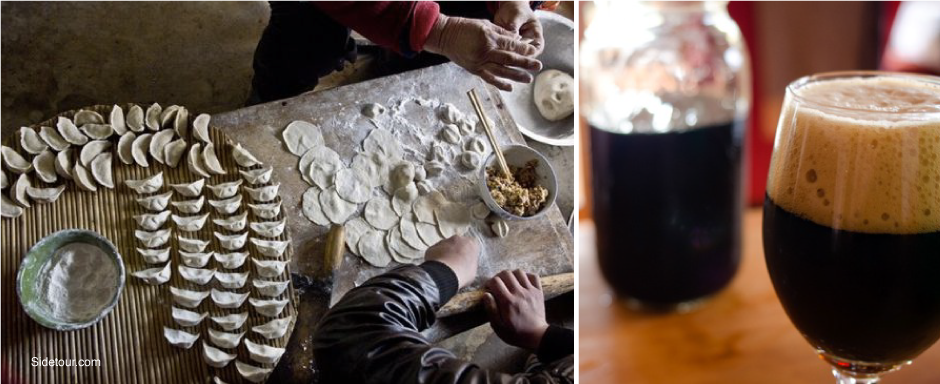Cultural Escorts
We explore how a new breed of travel start-ups are sidestepping tourism with the help of locals.

When Lucy Honeychurch from E.M Forster's A Room With a View first lands in Florence, she clutches her Baedeker tour guide with a shaking fierceness, indicative of just how travel worked back in 1908: by the book; always by the book. The story progresses to unravel a more liberated Lucy as she abandons her hardback friend, submitting herself to local navigation by more seasoned travellers, cultural escorts even, aware of the lay of the land and eager to offer a more updated counsel. Fast forward to today: the enormity of the world has formed a hunger to conquer each one of its destinations, and we’re laden with untold tips and best kept secrets.

We crowd-source on Facebook – consulting all six degrees of our connections – but what we want is a live version of all the content we access online, much like Lucy, feverish to experience everything. Enter the Cultural Escort: our expert and knowledgable personal guides to the parts of the city only the locals get to see. When we travel, the power of personal recommendations, no matter the medium, is still a central force as shown by the pillars-of-mass sites like Yelp, Tripadvisor and discovery tool Wanderfly. However each one is rife with a sea of anonymous (and thus unreliable) postings. "People are looking to trusted sources to help make sense of the world around them”, explains Jason Clampet, Head of Content at travel startup Skift.com, a daily news resource that aggregates data, trends and insights from the industry's large and small players. “For the last few years they've been charmed by the benefits of user-generated content on sites like Yelp. But user generated pluses are severely limited and the amount of garbage they generate is astounding”.
Travellers are seeking out experiences they can trust to be authentic, and recommendations from those who really know the destination, locals with shared interests, can offer visitors a taste of a city that they can’t get from traditional resources.
One company who have built around this idea is Sidetour. During a six month around-the-world trip with his wife, Founder and CEO Vipin Goyal, found that encounters with locals consistently formed their most poignant memories. He returned to New York eager to replicate what he had learnt, and defend the notion that our own cities can offer us the same level of curiosity and sense of fulfillment that he found on his trips to three continents, but only a subway ride away. "We’re reinventing the old-world behavior of making real-life connections in the digital age”, says Goyal. And through their online platform Sidetour offers unique, hard-to-reach, and authentic experiences hosted by passionate experts wanting to share their knowledge and love for their city. It could be a craft-beer tour of Brooklyn, a trip around the 5Pointz Aerosol Art Center with a graffiti connoisseur, or dining with an investment banker-turned-monk in an East Village monastery. “People hosting guests for a ‘local experience’ is as old as humanity itself", he explains. And by connecting individuals (and cutting out the middle-man) the site is reinventing the process of engagement between a 'visitor' and 'local'.
People now know much more about their destinations before they arrive, but they're still eager for a local's advice.

Boutique hotels are also adopting these concepts, and offering one-of-a-kind insights into life in a city that only locals get to see. Ecological hotel-apartment, Plus One Berlin offer a buddy-system for each guest where they can partner with a ‘plus one’ during their stay. Once booked, guests then hand-pick one of twenty eight passionate locals, with varying professions and areas of interest, who act as personal concierges. In either a 30 min advice session, or a 3-5 hour tour these ‘cultural escorts’ provide visitors with an authentic and bespoke guide into activities beyond the usual tourist traps.
In a regenerated shop-front, decorated by the city’s finest artists, the Urbanauts project in Vienna is another hotel-apartment taking a local-insider twist. For guests, all the traditional hotel amenities are dispersed within the local neighborhood: breakfast is served in Cafe Goldegg down the road, spa facilities are in the space adjacent, and dinner can be had at the restaurant next door. By interacting with the local infrastructure of the city, visitors are able to integrate with the locals and get an authentic experience of what it would be like to really live in that city, rather than being simply a tourist. That’s what ties these ideas together: the offering of an experience to understand a city or place like only a local could, and what simple research beforehand can’t deliver.
Classic corporate hotel brands are also catching on to this sense of bringing the exterior culture within their walls. Converging local culture with the design layout of the hotel lobby, Le Méridien Hub launched last year, providing a 'welcome zone' for guests to immediately engulf themselves in the local culture amidst large scale artwork and sensory points administered by sound, light and even scent. Similarly, The Space Program, at Singapore’s New Majestic Hotel, brought some of the city's most compelling art and retail into a destination experience for hotel guests and visitors. Another example is Dutch hotel chain, CitizenM who designed a program of events during the London Olympics, including talks by street-style photographers and local food vendors.
Although it’s mostly independents that are leading the way, leaps and bounds have been made by brands regarding the travel consumer. They’ve read the blogs on who’s who, translated the traditions of the travel guide and packaged it well. But Jason Clampet still believes that most are merely reacting to the current climate and not necessarily leading the way. “People now know much more about their destinations before they arrive, but they're still eager for a local's advice", he says. And he believes this leaves a big void for trusted, expert voices to fill, and that there is still an opportunity for smart brands, aware of this consumer desire for the local and authentic, to carve out their niche.
Providing natural dialogues between consumers on the ground and city locals is one unique way for brands to nurture personal experiences. Whether it’s a digital resource, the context of the accommodation, or real people, brands can embed themselves in the idea of cultural escorts, thereby acting as the catalyst that brings consumers directly to the actual experience – and consequently the magic of seeing a place like a local. Breaking down the barrier between 'us' and 'them' now arrives in the form of the cultural escort: our ultimate local friend, who can take us on a nuanced journey through a destination, instill an appreciation of exploration and true authenticity, and offer us an experience we couldn’t get anywhere else.
Photo: Sean Fennessy


